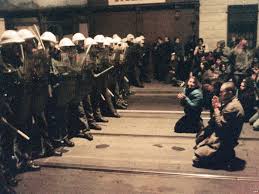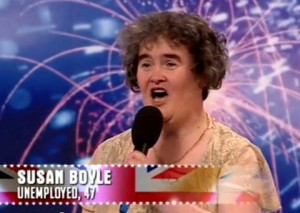Fourth Sunday of Advent Year C
December 20, 2015
On April 11, 2009 a stout, frumpy woman with unruly teeth and unkempt hair walked out on the stage as a contestant for the TV show Britain’s Got Talent. She wore a gold lace dress which didn’t work much in her favor. She told the folks who interviewed her for the competition that she was unemployed, single, lived with a cat called Pebbles and had never been kissed. She cared for her elderly mother and volunteered at her church.
This unassuming, awkward woman walked out on the stage to chatter, giggling, and a long and unpleasant wolf whistle. Amanda Holden, Piers Morgan and Simon Cowell smirked and rolled their eyes as the contestant stumbled introducing herself, saying where she was from and what she was going to sing.
Then she opened her mouth and this is what came out. (“I Dreamed a Dream” from Les Misérables.). The woman was Susan Magdalane Boyle. Her first album was released six months later and debuted as the number one best-selling album on charts around the globe.
This chubby, modest, inconspicuous woman knocked those three snotty, elitist, judges on their keisters not only with her amazing voice, but because she knocked away all of their puffed-up presumptions. This is a Cinderella story where the wallflower becomes the princess. This is the ugly duckling story where you can’t judge a book by its cover. And boy could this woman sing. And so could Mary.
Mary was much like Susan Boyle—living a quiet, unassuming life with her parents. She’s aware of her humble status—a woman, likely of a peasant class–in her time and culture. She was property as much as anything, belonging first to a father and then later to a husband (a husband who could divorce her at will in ways she herself could never initiate no matter what her circumstance). She didn’t belong to a famous family, hadn’t grown up in a metropolis, and had absolutely no prospects whatsoever to make a mark in the world or to ever be remembered beyond the next generation or so. Yet miraculously and startlingly, God visited her with news so stunning, it would take at least the rest of her life to understand it all.
As our scripture passage opens, she had just made a beeline to a small town in the hill country of Judea where her cousin Elizabeth lived. I imagine she was still reeling from the night before when the angel Gabriel, big as a bear and brighter than a star, announced that she would be the mother of Israel’s Messiah. Just when she was starting to wrap her head around this it dawned on her, “Holy cow! I’m pregnant!” What am I going to do?!” She must have panicked. “How will I explain it to Joseph, never mind my parents?!” She likely left Joseph a note: “Honey, something’s come up. I need some down time with my cousin Elizabeth. I know you’ll under-stand. I’ll see you in a few weeks.” The few weeks turned into three months, long enough for her to be showing when she returned home to Nazareth.
When she approaches Zechariah and Elizabeth’s home Mary shouts, “Hey Elizabeth, it’s me!” Then an amazing thing happened: the child leaped in Elizabeth’s womb. “And Elizabeth was filled with the Holy Spirit and exclaimed with a loud cry, ‘Blessed are you among women, and blessed is the fruit of your womb.’”
Note here that Elizabeth called out to Mary “in a loud voice.” It’s noteworthy because so far, most all of the action in Luke has been in the quiet shadows. Zechariah emerged from the Temple mute after an angel told him Elizabeth would bear a son. When Elizabeth became pregnant, scripture says she stayed in seclusion for five months. Mary likewise does not appear to have made any public pronouncements about what Gabriel had said to her—if I were her I wouldn’t say a peep to anyone! In fact, she may have visited Elizabeth because she was the only person she could trust. She needed a place to vent, a woman who would understand, a traveling companion. But once Mary arrives, those things that had been done in secret are revealed in a public way. Elizabeth is not shy to proclaim God’s truth with a loud voice. And neither is Mary.
 Mary sings out. And what did she sing? This is no lullaby. The words thunder forth like a battle cry: “He has shown strength with his arm, he has scattered the proud in the imaginations of their hearts, he has put down the mighty from their thrones; and the rich he has sent empty away.” Not too sweet a Christmas carol, I think. It’s a song about someone low going up, someone up high being brought low. You won’t hear women singing like this except in Syria, Afghanistan, Egypt, or in refugee camps around the world. A woman who has been battered living now in a safe shelter, a recovering drug addict or a woman pulled out of sex slavery—they would know how to sing a song like this.
Mary sings out. And what did she sing? This is no lullaby. The words thunder forth like a battle cry: “He has shown strength with his arm, he has scattered the proud in the imaginations of their hearts, he has put down the mighty from their thrones; and the rich he has sent empty away.” Not too sweet a Christmas carol, I think. It’s a song about someone low going up, someone up high being brought low. You won’t hear women singing like this except in Syria, Afghanistan, Egypt, or in refugee camps around the world. A woman who has been battered living now in a safe shelter, a recovering drug addict or a woman pulled out of sex slavery—they would know how to sing a song like this.
Mary’s song reveals that she has learned a thing or two about what God is up to and how God operates in the world. God’s reign is an upside-down kingdom where all is reversed and turned on its head. “The lowly are lifted up and the humble are exalted.” (Luke 1: 53)
Maybe Mary remembered her Bible stories. Maybe she remembered that God picked Abram and Sarai in their Golden Years to travel to a Promised Land. Maybe she remembered how God in Genesis always chose the younger child over the older child with the birthright. Maybe she remembered how God called stuttering Moses and vulnerable Ruth and the baby of the family named David to be Israel’s king. Maybe she recalled how God had chosen Israel and not mighty Babylon with its hanging gardens or extraordinary Egypt with its towering pyramids.
Perhaps she remembered all this and then connected all the dots to the child growing in her belly, a child so important that even her older cousin Elizabeth had just referred to him as “My Lord.” Mary was bearing Elizabeth’s Lord!! She was bearing the Savior of the nations!! Her. Little Mary. Mary the ordinary. Mary the garden variety. Mary the Susan Boyle of her day.
And as she pondered all this and treasured all these things in her heart, she connected a few more dots. In her song she saw that those who for now fancy themselves as captains of industry and masters of the universe—those with enough money to cause others to kowtow to them, who can buy politicians, rig markets, pull strings and leverage deals in their favor over the little guy—these allegedly rich and powerful folks are on the losing side of history. At the end of the cosmic day their wealth and worldly power were their only comfort in life and in death. They might gain the whole world, but if in so doing they will forfeit their own souls. They’d be sent packing, empty as a pocket and without hope.
Mary could see it as clear as crystal. God loves the poor, favors the disenfranchised, and has keen eyes locked onto the invisible members of society. And in the kingdom of her Child, all the wrongs that created the perpetually poor and the perennially invisible would be righted. All the injustices under which people suffer now would be ironed out in a new landscape of righteousness. The valleys where the poor wallowed will be raised up and the mountains where the haughty and cruel crowed would be made low.
Back in the early 80s, the government in Pretoria, South Africa, banned the lighting of candles or the singing of Christmas carols in Soweto. When asked why by the press, the South African government replied, “You know how emotional black women are. Christmas carols have an emotional effect upon them.” (St. Louis Post-Dispatch, Dec. 27, 1985). You let a poor Jewish woman like Mary sing, a black mother in Soweto sing, you never know where it might lead.
“Music hath power to soothe the savage beast,” says Shakespeare. True. But it also hath power to release, cut loose, pull down, raise up. African slaves knew this. When they sang their spirituals in the cotton fields they were not only praising God, but protesting the masters who locked them out of worship, yet couldn’t keep them from the promises of deliverance in the Bible.
 Singing has spawned some of the most profound social movements in this century. One only has to think of ribbons of protesters marching in Selma singing “We Shall Overcome,” during the Civil Rights movement. The protesters in Leipzig, Germany in 1989 knew this as well during the so-called “velvet revolution.” Many don’t know this, but several months before the fall of the Berlin wall, the citizens of Leipzig gathered on Monday evenings by candlelight around St. Nikolai church – the church where Bach composed so many of his cantatas – to sing. Over two months their numbers grew from a little more than a thousand people to more than three hundred thousand, over half the citizens of the city, singing songs of hope and protest and justice, until their song shook the powers of their nation and changed the world. (Later, when someone asked one of the officers of the Stasi, the East German secret police, why they did not crush this protest like they had so many others, the officer replied, and “We had no contingency plan for song.”). There is no contingency plan to the reign of God. It is here and it is coming in all of its fullness, like it or not.
Singing has spawned some of the most profound social movements in this century. One only has to think of ribbons of protesters marching in Selma singing “We Shall Overcome,” during the Civil Rights movement. The protesters in Leipzig, Germany in 1989 knew this as well during the so-called “velvet revolution.” Many don’t know this, but several months before the fall of the Berlin wall, the citizens of Leipzig gathered on Monday evenings by candlelight around St. Nikolai church – the church where Bach composed so many of his cantatas – to sing. Over two months their numbers grew from a little more than a thousand people to more than three hundred thousand, over half the citizens of the city, singing songs of hope and protest and justice, until their song shook the powers of their nation and changed the world. (Later, when someone asked one of the officers of the Stasi, the East German secret police, why they did not crush this protest like they had so many others, the officer replied, and “We had no contingency plan for song.”). There is no contingency plan to the reign of God. It is here and it is coming in all of its fullness, like it or not.
So this Christmas season can we sing Mary’s song? I hope so. I think so. If you’ve ever been a Susan Boyle and felt frumpy, insignificant, overlooked and underestimated, then you can sing with Mary who was overlooked, insignificant, and underestimated, but chosen by God for her quiet faithfulness to bear the Savior of the world. While you might not give birth to Jesus, you are still a God-bearer, one chosen to bring light, hope, comfort and peace into someone’s life and into this world. No one can ever say that you are worthless because God raises up the lowly and exalts those the world thinks are insignificant.
But can we sing all of it? If you’re like me, some of it sticks in my throat. Can Mary’s God truly be our Lord and our God — the God who overturns the way the world works, who elects the least and the last to bring in the kingdom, whose judgment will save the poor, the wronged and the oppressed? Can the God who is going to knock the powerful off their peacock thrones, their stock exchange seats, their professional chairs, and their benches of judgment really be our God? Can we really praise this God — Mary’s God?
 I know it may not feel like it but we are sitting pretty at the top of the world’s economic pyramid so it might be hard to sing. According to the United Nations, nearly half the world’s population, 2.8 billion people, survive on less than $2 a day. About 20 percent of the world’s population, 1.2 billion people, live on less than $1 a day. Nearly 1 billion people are illiterate and 1 billion do not have safe water. By the world’s standards, we in this country are so rich, so comfortable and so healthy, we can even fool ourselves into thinking we do not need God — certainly not Mary’s God! We want a therapeutic God who comforts us, but doesn’t challenge us. We like things the way they are, please leave well-enough alone.
I know it may not feel like it but we are sitting pretty at the top of the world’s economic pyramid so it might be hard to sing. According to the United Nations, nearly half the world’s population, 2.8 billion people, survive on less than $2 a day. About 20 percent of the world’s population, 1.2 billion people, live on less than $1 a day. Nearly 1 billion people are illiterate and 1 billion do not have safe water. By the world’s standards, we in this country are so rich, so comfortable and so healthy, we can even fool ourselves into thinking we do not need God — certainly not Mary’s God! We want a therapeutic God who comforts us, but doesn’t challenge us. We like things the way they are, please leave well-enough alone.
So what would Mary sing to us this Christmas when we feel overwhelmed by the threat of terrorism, when we hear of shocking gun violence and mass shootings almost every day, when we see politicians bloviating on the airwaves that they will bring the Second Coming if elected, when our fear prompts the latent racism and xenophobia that has always been there, when the frustrations over the treatment of young Black men and women by police spills into our city streets, when the atrocities of ISIL done in the name of God goes on and finally world leaders are finally beginning to address climate change?
She would say to us what she has said to every generation overshadowed by the same fears and challenges that we are: “[God’s] mercy extends to those who fear him, from generation to generation. He has performed mighty deeds with his arm; he has scattered those who are proud in their inmost thoughts. He has brought down rulers from their thrones but has lifted up the humble.”
That, my friends, is Mary’s gospel and ours today as well.

